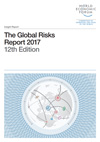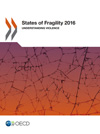-
World Economic Forum and OECD on Global Risks and Fragility: Treat the Contagion
January 18, 2017 By Schuyler Null The World Economic Forum’s 2017 Global Risks Report, like other recent analyses of global trends, notes “rising political discontent and disaffection,” but also significant concern for environmental issues. The forum polled 745 leaders, nearly half of whom are from the business community, on the likelihood and impact of various global risks. Participants named weapons of mass destruction the highest impact global risk. But the likelihood of them being used is considered minimal (only unmanageable inflation is considered less likely). A number of environmental-security-related risks, meanwhile, were named among the highest impact and most likely, in extreme weather events, natural disasters, and large-scale involuntary migration. All five environmental risks that the survey asked about rated above average in impact and likelihood. The good news? The risks of failing to adapt to and mitigate climate change and a major water crisis are considered less likely than last year.
The World Economic Forum’s 2017 Global Risks Report, like other recent analyses of global trends, notes “rising political discontent and disaffection,” but also significant concern for environmental issues. The forum polled 745 leaders, nearly half of whom are from the business community, on the likelihood and impact of various global risks. Participants named weapons of mass destruction the highest impact global risk. But the likelihood of them being used is considered minimal (only unmanageable inflation is considered less likely). A number of environmental-security-related risks, meanwhile, were named among the highest impact and most likely, in extreme weather events, natural disasters, and large-scale involuntary migration. All five environmental risks that the survey asked about rated above average in impact and likelihood. The good news? The risks of failing to adapt to and mitigate climate change and a major water crisis are considered less likely than last year. The Organization for Economic Cooperation and Development’s annual States of Fragility report calls for thinking about violence differently: treat it like a contagion, the authors say. Policies must interrupt its transmission, change peoples’ behavior, and ultimately change norms – otherwise it may continue to spread. Over the last 15 years, almost half the world’s population has been affected by or proximate to some form of political violence. The battlegrounds of Aleppo and Homs take the headlines, but non-conflict zones like Brazil and India actually accounted for more violent deaths than Syria in 2015. Low- and middle-income countries bear the brunt of political and social violence, and the OECD predicts the number of extremely poor people living in fragile contexts will increase from 480 million in 2015 to 542 million by 2035. Fragile settings already get the majority of development assistance, but it is often earmarked to address immediate problems – for “firefighting,” the authors say. More needs to support long-term structural change instead.
The Organization for Economic Cooperation and Development’s annual States of Fragility report calls for thinking about violence differently: treat it like a contagion, the authors say. Policies must interrupt its transmission, change peoples’ behavior, and ultimately change norms – otherwise it may continue to spread. Over the last 15 years, almost half the world’s population has been affected by or proximate to some form of political violence. The battlegrounds of Aleppo and Homs take the headlines, but non-conflict zones like Brazil and India actually accounted for more violent deaths than Syria in 2015. Low- and middle-income countries bear the brunt of political and social violence, and the OECD predicts the number of extremely poor people living in fragile contexts will increase from 480 million in 2015 to 542 million by 2035. Fragile settings already get the majority of development assistance, but it is often earmarked to address immediate problems – for “firefighting,” the authors say. More needs to support long-term structural change instead.Sources: Organization for Economic Cooperation and Development, World Economic Forum.
Topics: Brazil, climate change, conflict, development, economics, environment, India, population, poverty, Reading Radar, security, Syria, water
 A Publication of the Stimson Center.
A Publication of the Stimson Center.





